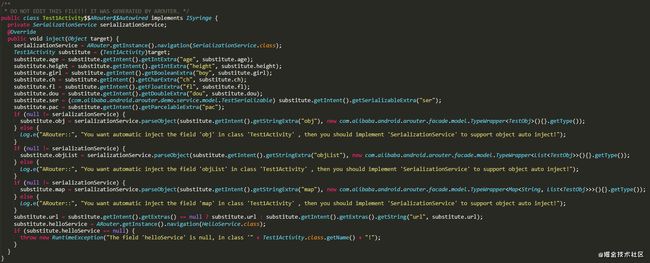ARouter讲解1-InterceptorProcessor
ARouter讲解2-AutowiredProcessor
Autowired
@Target({ElementType.FIELD})
@Retention(RetentionPolicy.CLASS)
public @interface Autowired {
// Mark param's name or service name.
String name() default "";
// If required, app will be crash when value is null.
// Primitive type wont be check!
boolean required() default false;
// Description of the field
String desc() default "";
}
概述
Autowired的对用是对字段进行注入,要不然就要用 getIntent().getIntExtra()之类的方法。这也会生成一个新的类,注入的操作也就在这个类中操作。就如同类似下面的类
详解
建议先看ARouter讲解1-InterceptorProcessor,因为这里讲解的比较详细,比如Element、TypeMirror是什么等,都在第一篇文章中讲了,这里就不再讲了。
// Autowired 注解用在字段上,字段在类或者接口里,这里的HashMap中的key就是类或者接口,value是这个类里被Autowired注解的元素
private Map> parentAndChild = new HashMap<>();
public boolean process(Set set, RoundEnvironment roundEnvironment) {
if (CollectionUtils.isNotEmpty(set)) {
try {
this.categories(roundEnvironment.getElementsAnnotatedWith(Autowired.class));
this.generateHelper();
} catch (Exception var4) {
this.logger.error(var4);
}
return true;
} else {
return false;
}
}
// 方法里的 elements 参数是字段元素,是字段一般都是在类或者接口里面
private void categories(Set elements) throws IllegalAccessException {
if (CollectionUtils.isNotEmpty(elements)) {
for (Element element : elements) {
// 获取这个字段所在的类或接口
TypeElement enclosingElement = (TypeElement) element.getEnclosingElement();
// 该类或者接口不能被 private 修饰
if (element.getModifiers().contains(Modifier.PRIVATE)) {
throw new IllegalAccessException("The inject fields CAN NOT BE 'private'!!! please check field ["
+ element.getSimpleName() + "] in class [" + enclosingElement.getQualifiedName() + "]");
}
if (parentAndChild.containsKey(enclosingElement)) { // Has categries
parentAndChild.get(enclosingElement).add(element);
} else {
List childs = new ArrayList<>();
childs.add(element);
parentAndChild.put(enclosingElement, childs);
}
}
logger.info("categories finished.");
}
}
parentAndChild就是收集类中所有被Autowired 注解的字段。
package com.alibaba.android.arouter.facade.template;
public interface ISyringe {
void inject(Object target);
}
private void generateHelper() throws IOException, IllegalAccessException {
// 先准备一些element
// com.alibaba.android.arouter.facade.template.ISyringe
TypeElement type_ISyringe = elementUtils.getTypeElement(ISYRINGE);
// com.alibaba.android.arouter.facade.service.SerializationService 这个是一个 IProvider ,我们后面讲
TypeElement type_JsonService = elementUtils.getTypeElement(JSON_SERVICE);
// com.alibaba.android.arouter.facade.template.IProvider
TypeMirror iProvider = elementUtils.getTypeElement(Consts.IPROVIDER).asType();
// android.app.Activity
TypeMirror activityTm = elementUtils.getTypeElement(Consts.ACTIVITY).asType();
// android.app.Fragment
TypeMirror fragmentTm = elementUtils.getTypeElement(Consts.FRAGMENT).asType();
// android.support.v4.app.Fragment
TypeMirror fragmentTmV4 = elementUtils.getTypeElement(Consts.FRAGMENT_V4).asType();
// Build input param name.
// 方法的参数类型与参数名
ParameterSpec objectParamSpec = ParameterSpec.builder(TypeName.OBJECT, "target").build();
if (MapUtils.isNotEmpty(parentAndChild)) {
// 遍历一个每一个类内部带有Autowired 注解的字段
for (Map.Entry> entry : parentAndChild.entrySet()) {
// Build method : 'inject'
// 构建一个方法,public void inject(Object target)
MethodSpec.Builder injectMethodBuilder = MethodSpec.methodBuilder(METHOD_INJECT)
.addAnnotation(Override.class)
.addModifiers(PUBLIC)
.addParameter(objectParamSpec);
TypeElement parent = entry.getKey();
List childs = entry.getValue();
// 该类的全限定名
String qualifiedName = parent.getQualifiedName().toString();
// 类的包名
String packageName = qualifiedName.substring(0, qualifiedName.lastIndexOf("."));
// 类的名字,注意 生成薪的类的后面追加了 $$ARouter$$Autowired
String fileName = parent.getSimpleName() + NAME_OF_AUTOWIRED;
// 构建一个类,实现 ISyringe 接口,访问方式是public
TypeSpec.Builder helper = TypeSpec.classBuilder(fileName)
.addJavadoc(WARNING_TIPS)
.addSuperinterface(ClassName.get(type_ISyringe))
.addModifiers(PUBLIC);
// 添加一个成员变量 serializationService
FieldSpec jsonServiceField = FieldSpec.builder(TypeName.get(type_JsonService.asType()), "serializationService", Modifier.PRIVATE).build();
helper.addField(jsonServiceField);
// 在inject 方法内部
// serializationService = ARouter.getInstance().navigation(SerializationService.class);
// serializationService 的作用是序列化对象,将对象转换成json进行传递
injectMethodBuilder.addStatement("serializationService = $T.getInstance().navigation($T.class)", ARouterClass, ClassName.get(type_JsonService));
injectMethodBuilder.addStatement("$T substitute = ($T)target", ClassName.get(parent), ClassName.get(parent));
// Generate method body, start inject.
for (Element element : childs) {
Autowired fieldConfig = element.getAnnotation(Autowired.class);
// 元素的名字
String fieldName = element.getSimpleName().toString();
if (types.isSubtype(element.asType(), iProvider)) { // It's provider
// 如果 element 是 IProvider 的子类
if ("".equals(fieldConfig.name())) { // User has not set service path, then use byType.
// Getter
// substitute.{fieldName} = ARouter.getInstance().navigation( {elementClass}.class),{}表示占位
injectMethodBuilder.addStatement(
"substitute." + fieldName + " = $T.getInstance().navigation($T.class)",
ARouterClass,
ClassName.get(element.asType())
);
} else { // use byName
// Getter
// substitute.{fieldName} =({elementClass}) ARouter.getInstance().build({ConfigName}).navigation()
injectMethodBuilder.addStatement(
"substitute." + fieldName + " = ($T)$T.getInstance().build($S).navigation()",
ClassName.get(element.asType()),
ARouterClass,
fieldConfig.name()
);
}
// Validator
if (fieldConfig.required()) {
// 如果 required 是true,注入后需要检查是不是null
injectMethodBuilder.beginControlFlow("if (substitute." + fieldName + " == null)");
injectMethodBuilder.addStatement(
"throw new RuntimeException(\"The field '" + fieldName + "' is null, in class '\" + $T.class.getName() + \"!\")", ClassName.get(parent));
injectMethodBuilder.endControlFlow();
}
} else { // It's normal intent value
String originalValue = "substitute." + fieldName;
String statement = "substitute." + fieldName + " = " + buildCastCode(element) + "substitute.";
boolean isActivity = false;
if (types.isSubtype(parent.asType(), activityTm)) { // Activity, then use getIntent()
// 类似 这样 substitute.age = substitute.getIntent().getIntExtra("age", substitute.age);
isActivity = true;
statement += "getIntent().";
} else if (types.isSubtype(parent.asType(), fragmentTm) || types.isSubtype(parent.asType(), fragmentTmV4)) { // Fragment, then use getArguments()
// 类似 substitute.name = substitute.getArguments().getString("name", substitute.name);
statement += "getArguments().";
} else {
throw new IllegalAccessException("The field [" + fieldName + "] need autowired from intent, its parent must be activity or fragment!");
}
statement = buildStatement(originalValue, statement, typeUtils.typeExchange(element), isActivity, isKtClass(parent));
if (statement.startsWith("serializationService.")) { // Not mortals
injectMethodBuilder.beginControlFlow("if (null != serializationService)");
injectMethodBuilder.addStatement(
"substitute." + fieldName + " = " + statement,
(StringUtils.isEmpty(fieldConfig.name()) ? fieldName : fieldConfig.name()),
ClassName.get(element.asType())
);
injectMethodBuilder.nextControlFlow("else");
injectMethodBuilder.addStatement(
"$T.e(\"" + Consts.TAG + "\", \"You want automatic inject the field '" + fieldName + "' in class '$T' , then you should implement 'SerializationService' to support object auto inject!\")", AndroidLog, ClassName.get(parent));
injectMethodBuilder.endControlFlow();
} else {
injectMethodBuilder.addStatement(statement, StringUtils.isEmpty(fieldConfig.name()) ? fieldName : fieldConfig.name());
}
// Validator
if (fieldConfig.required() && !element.asType().getKind().isPrimitive()) { // Primitive wont be check.
injectMethodBuilder.beginControlFlow("if (null == substitute." + fieldName + ")");
injectMethodBuilder.addStatement(
"$T.e(\"" + Consts.TAG + "\", \"The field '" + fieldName + "' is null, in class '\" + $T.class.getName() + \"!\")", AndroidLog, ClassName.get(parent));
injectMethodBuilder.endControlFlow();
}
}
}
helper.addMethod(injectMethodBuilder.build());
// Generate autowire helper
JavaFile.builder(packageName, helper.build()).build().writeTo(mFiler);
logger.info(">>> " + parent.getSimpleName() + " has been processed, " + fileName + " has been generated. <<<");
}
logger.info(">>> Autowired processor stop. <<<");
}
}
最后生成的类就类似下面这样


